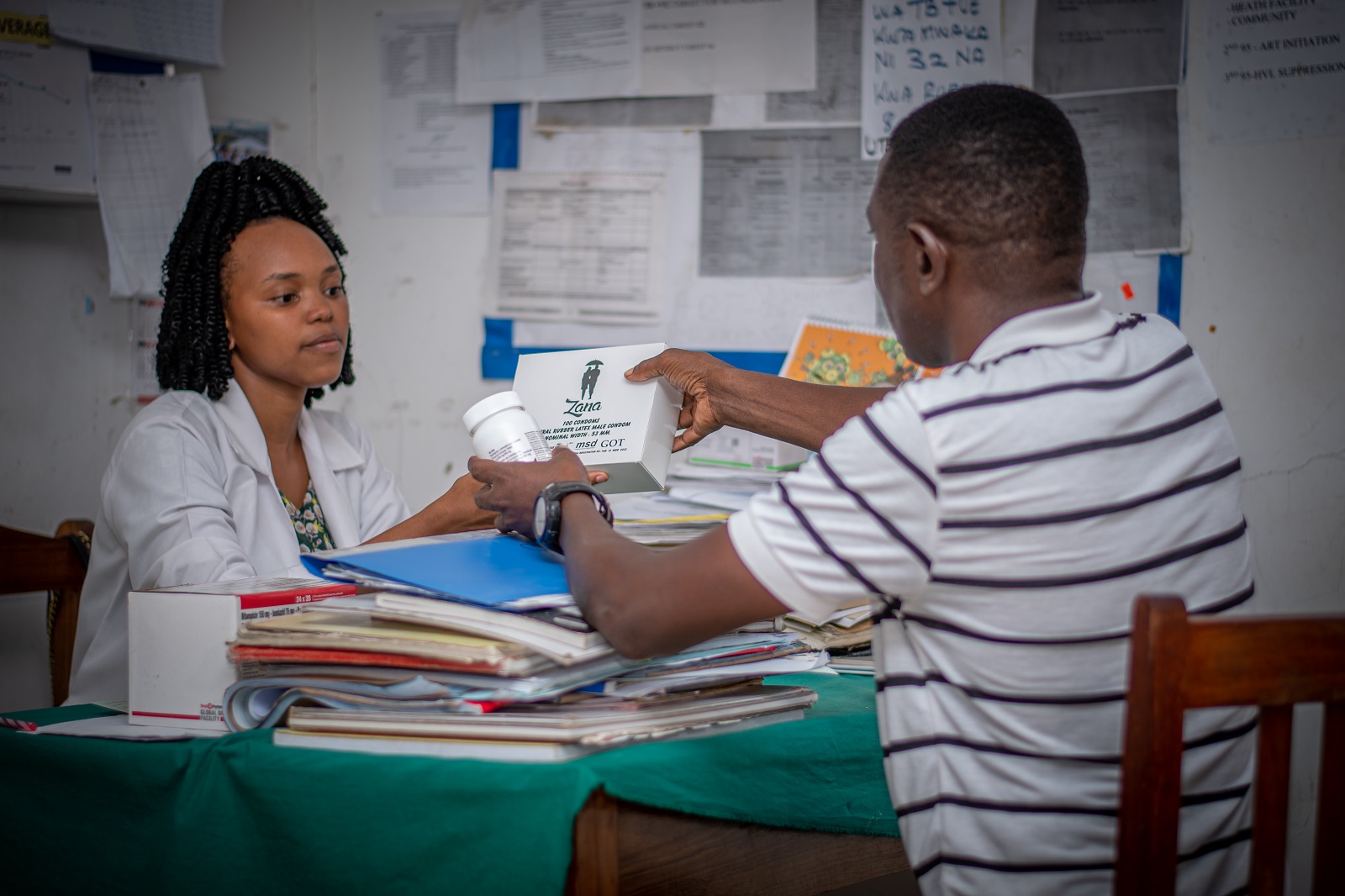

Dr. Glory Joseph, in charge of CTC at Muungano Health Centre counsels a client on HIV/AIDS care and treatment Services in Bariadi district Council, a U.S CDC supported site in Simiyu Region. Photo credit Amref Health Africa Tanzania.
Komba (not his real name) is a 43-year-old man with three wives who regularly attends the Antiretroviral Therapy (ART) clinic at Muungano Health Centre in Simiyu, Tanzania. During his last visit, Dr. Glory, who is in charge of the Care and Treatment Clinic (CTC), explained to Komba that if his viral load test showed suppressed HIV levels, he could qualify for a six-month ARV prescription. However, it was the next set of questions that captured Komba’s attention: “Do you have children? Are they tested for HIV? Do you have a spouse? Is she tested?”
Komba was honest with Dr. Glory, revealing that he had three wives and believed he was the only one infected with HIV. He had also been working in mining and had multiple sexual partners, which is how he became aware of his status. Komba was unsure of how to tell his wives he was HIV positive, so none of them had been tested. Dr. Glory explained a new strategy to reach out to the spouses, children, and other contacts of ART patients with HIV testing, especially if they had not been tested before. It is called index testing.
Index testing, also known as partner testing/partner notification services, is an approach that offers HIV testing services to exposed contacts of an HIV-positive person, including sexual partners, biological children, or anyone with whom a needle was shared. After learning about index testing, Muungano Health Centre used the approach to test Komba’s family. One of his wives and two biological children were found to be HIV positive and were initiated into care and treatment services.
Amref Health Africa in Tanzania, in collaboration with local government authorities, implements the United States Government Centers for Disease Control and Prevention supported Afya Kamilifu project, a five-year project aimed at controlling the HIV epidemic in Tanga, Simiyu, Mara, and Zanzibar. The project, with its collaborators, has significantly reduced transmission rates and improved the lives of many beneficiaries in Simiyu region.
Incorporating an index-testing approach in the Simiyu region is part of their HIV/AIDS Care and Treatment Cascade, aimed at contributing to the efforts of Tanzania in attaining the 95-95-95 fast-track target to eliminate AIDS by 2030, through its approach, it has yielded positive outcomes by preventing new HIV infections.
According to Dr. Edwin Kilimba, the Afya Kamilifu project’s director, index testing has been a game-changer for the health sector in Tanzania. The strategy is now routinely used across the Simiyu region and relies on identifying and reaching high-risk populations. The strategy aims to identify the sexual partners and family members of individuals newly diagnosed with HIV and those with unsuppressed viral load, and test them for HIV. By testing and treating these individuals, the aim is to prevent further transmission of the virus.
Dr. Glory Joseph, the Care and Treatment Clinic (CTC) in charge at Muungano Health Centre in Simiyu, says that index testing has made it possible to identify and treat those who may not have otherwise sought out testing services. It has enabled targeted interventions and ensured that those diagnosed with HIV receive the care and treatment services needed.
Dr George Mgomella U.S CDC Associate Director of Programmes, says that in implementing the first 95, testing is a key area of focus, and index testing remains a critical strategy that should be prioritized as it is cost-effective, evidence-based, and has the potential to significantly reduce new infections and HIV-related deaths to achieve the goal of ending AIDS by 2030.
Dr. Khamis Kulemba, the Regional AIDS Coordinator in the Simiyu region, explains that index testing has enabled medical practitioners to trace many clients compared to other traditional means of HIV testing, such as client-initiated testing. Through the index testing strategy, an individual who attends HIV testing services and learns that he or she is HIV positive becomes an index case. This index client is asked to identify and refer others in his or her family or social network, such as a spouse, sexual partners, children, or siblings, to a health facility for HIV testing.
Index testing has proven to be a crucial strategy in Tanzania’s fight against the HIV epidemic. By identifying and testing sexual partners and family members of individuals newly diagnosed with HIV, it has helped to prevent further transmission of the virus. The approach has yielded impressive results, and the United States Government Centers for Disease Control and Prevention, the Tanzanian government, and many practitioners in the field endorse it as an essential tool to end AIDS by 2030.
Story by (Julieth Mongi & Adrian Mgaya)
Achuman Emoni stretches her hands, illustrating the vast distance she has travelled to reach the…
During a session held at Africa Health Agenda International Conference in Kigali, Rwanda, on 4th…
Amref Health Africa, in collaboration with the Turkana County Department of Health Services, introduced the…
Amref Health Africa, in collaboration with the Turkana County Department of Health Services, introduced the…
Over the past six years, Amref Health Africa has positioned itself as a leading voice…
Africa has made significant strides in advocating for health research and development, yet gaps in…